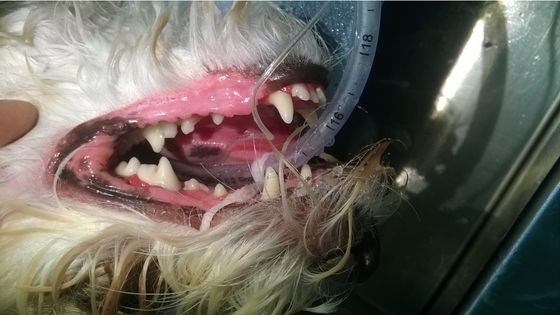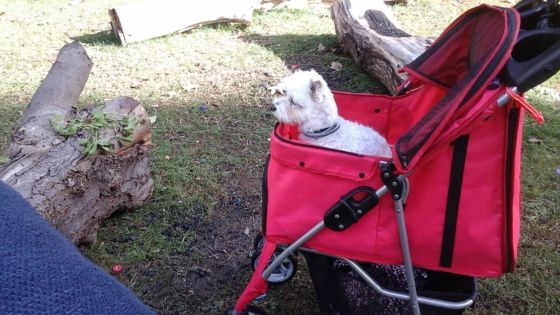Whether this behavior is recent or worsening over time, senior dog aggression can be managed.
Snapping, snarling, and barking incessantly can all seem like aggressive behavior, but it’s often due to pain or anxiety. Once we figure out the reason for this behavior, things like medication, supplements and in some cases training, can all make a big difference.
Does it feel like you woke up one day, and your once docile and sweet pup started acting like a character out of some horror flick? Okay I may be exaggerating slightly, but I think you get the picture. On the flip side, it could be his pain or anxiety has been coming on ever so slowly, it was hard to notice until he started becoming “aggressive.”
Signs of Dog Aggression
There are ways senior dog aggression can manifest itself:
- Snapping
- Snarling
- Nipping or biting you, other family members, friends, strangers, dogs
- Barking incessantly and frantically
Causes of Senior Dog Aggression
Anxiety
Dogs can experience an increase in anxiety as they age which could be generalised, or in a specific situation such as when left alone. A dog that always coped well with separation in his younger years, may become very anxious as he ages. Anxiety can also be caused by vision loss, hearing loss, dementia or all three!
Read this ⇒ “22 Natural Ways to Calm Your Anxious Dog“
Pain or Discomfort
It’s perfectly normal for a dog that’s experiencing pain to lash out. It doesn’t matter if it’s caused by arthritis, hip dysplasia, dental disease or recovery from surgery to name just a few examples.
Some signs your dog may be in pain
- Whining or whimpering
- Clinginess
- Lack of interest in things he used to enjoy
- Reluctant to go for walks/unable to walk
- Lethargy
- Difficulty sleeping or resting
- Licking one spot on his body
- Difficulty getting up and lying down
Whether you’ve noticed any of these or just a feeling something isn’t right, I recommend a visit to the vet. Once a diagnosis has been made, a treatment plan will be put together to manage the condition(s). Depending on your vet, it can include pain medication, natural supplements, acupuncture and hydrotherapy to name a few options.
Read this ⇒ “5 Effective Ways to Reduce Pain in Dogs With Arthritis“
Dental Disease

This is a very painful condition, so aggression is certainly understandable.
If your dog has bad breath, is pawing at his mouth, drooling or lost interest in food or treats, take him to the vet right away. If he does have dental issues they can be sorted, the pain will disappear and so will his aggression (if it was the sole cause).
Daily brushing, water additives and dental chews can all help keep your dog’s mouth healthy once he’s had his dental surgery.
Lack of Energy or Mobility
If he can no longer keep up with a younger dog in the home, attempts by the other dog to play can be met with aggression. It doesn’t help if a lack of mobility prevents him from removing himself from an annoying situation. Teach the younger one to stay away, supervise when they’re together and separate them when necessary.
Dog Dementia
Confusion, anxiety and not recognising the familiar are just some of the symptoms associated with dementia. Not only does it cause anxiety, but it can lead to an otherwise sweet natured dog displaying bouts of aggression.
Here are four articles I wrote about dementia, I hope you will find them helpful.
Does Your Senior Dog Have Dementia
A Comprehensive Guide to Dog Dementia
My Life as a Dog with Dementia
Vision and/or Hearing Loss
Imagine how scary it must be for your dog as he starts to lose his hearing, vision or both. He has no idea what’s going on, and because he is startled more easily, he may lash out before he realises who’s approaching. A once enjoyable ride in the car or a visit to a local café, can all be filled with anxiety.
Here are some ways to accommodate these changes:
- Calling out and somehow making your presence known before touching him – and that includes telling everyone else to do the same
- Not moving furniture around so he doesn’t bump into things and get scared
- Keep the floors clutter free so he doesn’t trip, get hurt and become anxious
- Try and keep the noise and activity level down for a bit
Brain Tumour
Not common but not unheard of, a mass on the brain can cause a sudden change in personality. A change in behavior, seeming unsteady or a head tilt are symptoms. It could also signal vestibular disease so best to see your vet.

A New Pet
The introduction of a new pet into the home can cause senior dog aggression. He’s anxious because of the change in routine, he may not be getting as much attention/walks as he used to, or the new family member is bugging him. Pay extra attention to him, and monitor interactions. If your senior isn’t feeling well, unwanted attention is the last thing he needs.
How to Calm an Aggressive Dog
Be aware of what induces aggression
Take note of situations when you’ve seen your dog show aggression, and include as much information as you can –
- Time of day
- Type of behaviour you witnessed (film it if possible)
- What your dog was doing right before it happened
- Was anyone bothering the dog
Being aware of the situations that induce aggression, means there are things you can do to prevent or minimise them.
Take your dog to the vet
Unless you’re absolutely sure what’s causing this behavior, I recommend you take your dog to the vet. Aggression in older dogs is usually down to a health issue, so please don’t adopt a “wait and see” attitude.
Joint pain/mobility
If it’s painful for your dog to walk, subtler signs may not have been recognised, so aggression is how he’s communicating that discomfort. Please don’t beat yourself up feeling like you’ve missed something. Dogs are great at hiding pain, but also it can be such a gradual change it’s easy to assume it’s all a natural part of aging.
Medication and supplements can make a huge difference, and so can mobility aids:
♦ Harness – the Help ‘Em Up Harness is super popular, and I’ve lost count of how many senior dog parents I know love it! Visit their website for more information.

♦ Pet stroller – a pet stroller is my favorite mobility aid for my dogs. I use it every day (see picture above), and I don’t know where I would be without it. The ones I’ve linked to are the same style as mine, just a different brand. It’s basic and works best on pavement, but that’s all I need. There are lots of other styles depending on use, and prices depending on budget.
♦ Ramp – whether your dog needs help getting into a car or onto the couch, you’ll find a ramp to suit.
♦ Mats on slippery floors
Create a quiet space
Make sure your dog has a quiet space to retreat to, an area that is his where no one will bother him. Whether you want to add a covered crate he can crawl into (leave the door open) or set up a bed in a quiet corner or another room, it’s important to keep him away from stress.
Explain what’s going on to the rest of the family
Let everyone know what’s going on, and together come up with strategies to help your dog.
Play calming music
A CD called “Through a Dog’s Ear” was a sanity saver, when my dog Red was experiencing high anxiety due to dementia. It would calm her down in no time, and reduced the stress all of us were feeling. Listen to a free, 15 minute sampler of volume 1 on Youtube.
CBD oil
While I don’t believe CBD oil is a cure for everything that ails humans and animals, the success stories I read from senior dog parents I know is compelling, and cannot be ignored. If your dog is ultimately diagnosed with pain or anxiety, CBD oil may be an option, but check with your vet first. See the article below for more information.
Valerian and Skullcap
Another possible aid is Valerian and Skullcap which is used to treat anxiety, if that’s what the aggression stems from. See the article below for more information.
Read this ⇒ “How to Calm Dog Anxiety Naturally (22 Easy Ways)“
Has your senior dog suddenly started displaying aggressive behavior, or has it just been getting worse over time? What was your vet’s diagnosis and treatment plan? Sharing helps others so please leave your tips in the comments below.
I help senior dog parents struggling with anticipatory grief and quality of life issues by offering practical tips, advice and one on one support. I am also a Pet Loss Bereavement Specialist, helping you navigate through your pet loss journey.
Visit my services page to book a FREE 20 minute discovery call, or email me (Hindy) at hpearson141@gmail.com if you have any questions.
I’ve been rescuing and caring for senior dogs since 2009. From vision and hearing loss to obesity, dementia, kidney disease, liver issues, cardiac problems, Cushing’s, mobility challenges and more, you could say I’ve dealt with and learned a lot! In addition to my hands on experience, I’ve taken many courses and earned several qualifications to keep learning how to help senior dogs and they include: Senior Dog Enrichment, Understanding Canine Anxiety, Care of the Senior Pet and I’m a Certified Pet Loss Specialist.

